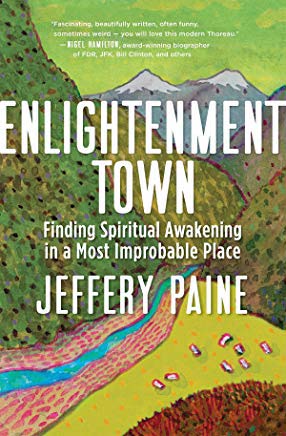|
 An
excerpt from Enlightenment
Town: Finding Spiritual Awakening in a Most
Improbable Place by Jeffery
Paine An
excerpt from Enlightenment
Town: Finding Spiritual Awakening in a Most
Improbable Place by Jeffery
Paine
The
protagonist of Enlightenment Town is Crestone
Colorado, a remote Rocky Mountain hamlet that hosts
numerous religious centers, a disproportionately large
number per capita, that co-exist harmoniously, even
reinforcing one another.
In
writing about the rungs ascended for spiritual
development, Paine sites malleability and illustrates
his point with the experience of "D.," a
Crestonian:
Many
a year D. has lived in Crestone, but her breakthrough
insight occurred elsewhere, while she was vacationing in
India. That country, which one supposedly either loves
or hates, left her indifferent; nor was she bashful in
voicing her distaste. In Rajkot, she challenged the
travel agent, "Besides Gandhi's old ashram, does
this crummy town boast anything worth a second or even
at first glance?" "Most
affirmative!"
replied the travel agent. "The Ramakrishna
Monastery."
When
D. phoned the monastery, a monk invited her for tea,
surely a pro forma courtesy. When she at last
ambled over, however, the monk had been waiting for her
with tea for six hours. "Esteemed Guest, does our poor
country please you?" came the inevitable question.
"What do you think of Holy Mother India?"
D.,
young and brash, thought India a nuthouse with loonies
worshipping idols, even giving them " just what a god
wants [sarcasm] milk baths." The sympathetic monk
explained that attending to the deity's statue, the
statue itself, was not necessary. Divinity is,
however, so beyond human comprehension, the monk went
on, that it is a kindness to provide something to settle
the eyes on and to give your hands occupation. Gandhi,
when his countrymen gushed, "Thank you for all
you're doing for India!" would reply, "No, I'm
doing it for myself." Likewise for religious
observance, the monks said, we are doing it for
ourselves.
Well,
that made a little sense. India's hocus-pocus
hodge-podge of alien rites was then not a worshipping of
idols (gods) but a way of activating certain latent
energies in the worshipper otherwise left dormant. A
great shift in the inner life occurs it was
occurring for D when one progresses from venerating
the outward form to realizing the buddha or gnostic
Christ within. Ultimately all outward forms of worship,
the monk told D., may be arbitrary, but they can still
improve our outlook and inspire us to better actions
"proof of the pudding!" the monk exclaimed
and in the process become necessary for us.
Once
back in Crestone, D. had a different outlook about
religious rituals and practices: even if they had
originated as imaginative human creations, they could be
validated or experienced and thus become felt
reality through participating in their ceremonies
and celebrations. Now when Buddhist rimpoches
visited Crestone, though she considered herself
Christian, D. no longer hesitated to prostrate before
them. Prostration is only a gesture, after all.
Such arbitrary gestures, she now saw, give elusive
meaning form, and the form becomes presence, and the
presence makes the ineffable almost tangible.
Enlightement
Town, Page 207-209
Vedanta
Writings Homepage
|